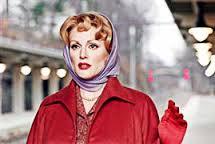Make Your Hero Suffer, Part Three
Continuing our exploration of the protagonist’s ordeal:

Julianne Moore as a 50s housewife in Todd Haynes’ “Far From Heaven”
Why, we might ask, does the hero have to suffer at all? Why can’t she just be happy? Wouldn’t that work just as well in a story?
Answer: no.
The hero has to suffer because:
Suffering is part of the Hero’s Journey (as articulated by Joseph Campbell, C.G. Jung, and others) and virtually every story is a version of the Hero’s Journey. But more importantly …
Suffering produces insight. Suffering leads to wisdom. Suffering forces the hero to change.
Jack Nicholson changes in Chinatown, Julianne Moore changes in Far From Heaven, Alan Ladd changes in Shane. Each one traverses a hero’s journey. Each one suffers. Each one is altered by his or her suffering.
You, the writer, invent your hero’s suffering for precisely this reason. What ordeal, you ask yourself, can I put my protagonist through that will compel her to deepen her understanding of life and of herself, that will force her to confront some issue she has been either oblivious to or deliberately hiding from, that will make her change and grow (even if that change and growth involve further suffering)?
You ask yourself that because if you didn’t ask it, there’d be no story.
Far From Heaven is not the world’s greatest movie, but it’s a really interesting and provocative one. It was written and directed by Todd Haynes (who just did Carol).
Let’s examine it in terms of the hero’s suffering.
Far From Heaven is a period piece, set in 1957 Connecticut. Julianne Moore is the protagonist. When we meet her at the story’s start, she’s a happy suburban wife with a handsome, successful husband (Dennis Quaid), two beautiful kids, a great house, etc. By movie’s end, her hubby has turned out to be gay, the marriage has imploded, the kids are shell-shocked, Julianne’s broke, with no marketable job skills, not to mention she’s also had a heartbreaking platonic affair with her complex and highly intelligent African-American gardener (Dennis Haysbert) that leaves her not only emotionally devastated but a social outcast to all the other little suburban housewives who had been her friends.
What I love most about this movie is the final visual.
It’s a crane shot, looking down on the center of the suburban town. Julianne Moore is in her station wagon, packed up, with the two kids in back. She is leaving the wreckage of her once-happy life. We don’t know where she’s going (neither does she), what she will do, or how she will survive. The camera pulls back, back, back, widening the shot as the station wagon drives off (Oh, I forgot to say: it’s winter) to heaven only knows where.
Julianne has suffered, and she’s about to suffer a lot more.
Is it an unhappy ending?
Is it tragic?
No, because her suffering has produced wisdom.
Julianne has gone from a blind (or, better, self-blinded), dependent, clueless conformist who is living a lie to a heartbroken but now-eyes-wide-open individual who recognizes her predicament and is, at last, facing the fact that she and only she can create a way out of it.
Suffering elevates consciousness.
Suffering wakes us up.
As we in the audience watch Julianne drive off in her town-and-country wagon we might ask ourselves, “Who would we rather be? One of the brain-dead, affluenza-addled housewives still sipping martinis in Suburbanville—or Julianne, who now at least knows the score and, somehow, someway, will find her way eventually?”
Please note, too, that Julianne’s suffering is totally on-theme.
The theme of Far From Heaven is self-delusion.
Who could be more self-deluded that a happy young wife in the American suburbs of the 50s?
Todd Haynes’ movies (see Carol as well) are usually about a surface reality that is in conflict with a hidden reality. The hidden reality is the real one. The track of the story is from false reality to real reality.
The medium of transition is the hero’s suffering.
Why suffering?
Because it hurts to wake up. It hurts to change. It hurts to have your eyes opened to something you’ve been squeezing them shut against your whole life.
So …
To recap the past three weeks’ posts:
Don’t be afraid to make your hero suffer.
Keep the suffering on-theme.
Make the suffering produce greater consciousness in the hero.
Make the suffering produce change in the hero.
If you can stand it, I’m going to stay on this subject next week too. We’ll talk about that old cliche, the character’s “arc,” and examine how this works with suffering.



